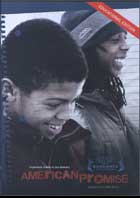
American Promise 2013
Distributed by Ro*co Films International, llc, 80 Liberty Ship Way, Suite 5, Sausolito, CA 94965; 415-332-6471
Produced by Joe Brewster and Michéle Stephenson
Directed by Joe Brewster and Michéle Stephenson
DVD , color, 135 min., 80 min., 45 min. & 30 min. versions available
Sr. High - General Adult
African Americans, Documentaries, Education
Date Entered: 09/04/2014
Reviewed by Brandon West, Instructional Design Librarian, State University of New York at OswegoAmerican Promise is an enlightening documentary that blends the lines between a home movie and an examination of education in the United States. The premise behind this documentary is that African American family Joe Brewster and Michéle Stephenson film the educational experience their son Idris and his friend Seun from kindergarten to graduation. The twist on this documentary is that the Brooklyn natives are enrolled at The Dalton School, a prestigious private school on the Upper East Side of New York.
The film documents more than just their schooling; it peers into the boys’ social lives, interests, coming-of-ages challenges, and home life. Eventually, the boys end up on different educational pathways and Seun ends up leaving Dalton for public school. Once this happens, the focus of the film weighs more on Idris. Given that twelve years of footage were edited down to two hours and fifteen minutes, the film retains a feeling of authenticity and the edits are fair to those who they are portraying; teachers are not demonized nor are the parents presented as perfect human beings. One scene that exemplifies this is after one of Idris’ basketball games. He is upset after the game and his father pokes fun at him and criticizes his performance, even though it is fairly clear that Idris is upset. Overall, the feeling of the film is intimate and it is easy to connect to the people in the film, especially as some of them go through heartbreaking tragedies.
The beauty of this documentary is its ability to bring up complex issues while limiting any opinions of the filmmakers. Some of the themes that seem to naturally arise in Idris and Seun’s journey include the issues of socioeconomics and race in schooling, the achievement gap in the educational system, and diagnosis of learning disabilities in children. In a particularly poignant scene, several of the African American families at The Dalton School meet to discuss their children’s education and note that all of their children seem to be experiencing similar issues in the classroom regarding the ability to keep up with challenges and the supposed behavioral issues. Another time, Idris’ father, Joe, discusses how many of the Upper East Side families get tutoring for their children at the price tag of up to $30,000, which is in addition the cost of the school’s pricey tuition. This makes Joe ponder how can his child succeed in this type of environment given his child’s economic disadvantage. The documentary does not try to answer these questions, but rather leaves the viewer to ponder them.
While the issues naturally arise in the film, there are many questions both in the content of what’s happening on screen, as well as in the larger context that naturally arise. Both Idris and Seun experience difficulties in being successful in their schooling, yet there is very limited insight into what the teachers or school administrators are doing to help the boys succeed. It’s obvious that this documentary is not seeking to harm The Dalton School’s reputation, but it would be nice to see more behind-the-scenes and rationale for the boys’ lackluster performances. While many issues are brought to light, there is no conclusiveness. For example, after the group of African American parents meet, their concerns are neither addressed nor discussed in the remainder of the film.
Many different types of audiences will be able to enjoy this documentary; given that the film’s subject matter is relatable. In particular, this film will provide value to the college classroom. There are many social and educational issues present in the film that are likely to fit in the curriculum for many different social sciences courses, such as foundational Education courses that survey the issues in American school systems. This film should raise plenty of questions with its viewers, which can turn into rich classroom discussions and topics for further research.
Overall, American Promise is an interesting look into the world of academic achievement in the context of middle class African Americans. The film is does not sensationalize issues or make accusations, it simply provides an honest look at what happened to young boys during their education. There is much to be taken away and discussed from viewing the film, which make it a worthwhile addition to library collections.
Versions: The educational edition of the DVD comes with four versions of the film. The theatrical version is 135 minutes long. The 80-minute version of the theatrical release maintains a strong narrative by removing some scenes that are not essential to the documentary’s narrative. The 45-minute version pares the film down to the essential issues, while the 30 minute “Youth Module” highlights scenes featuring Idris and Seun not shown in the full-length film. The educational edition also comes with educator and youth discussion guides.
Awards
- 2013 Jury Award, Sundance Film Festival
- 2013 African-American Film Critics Association Award for Best Documentary Film
- 2013 Jury Award, Full Frame Documentary Film Festival
- 2013 Best Documentary, Hot Springs Documentary Film Festival